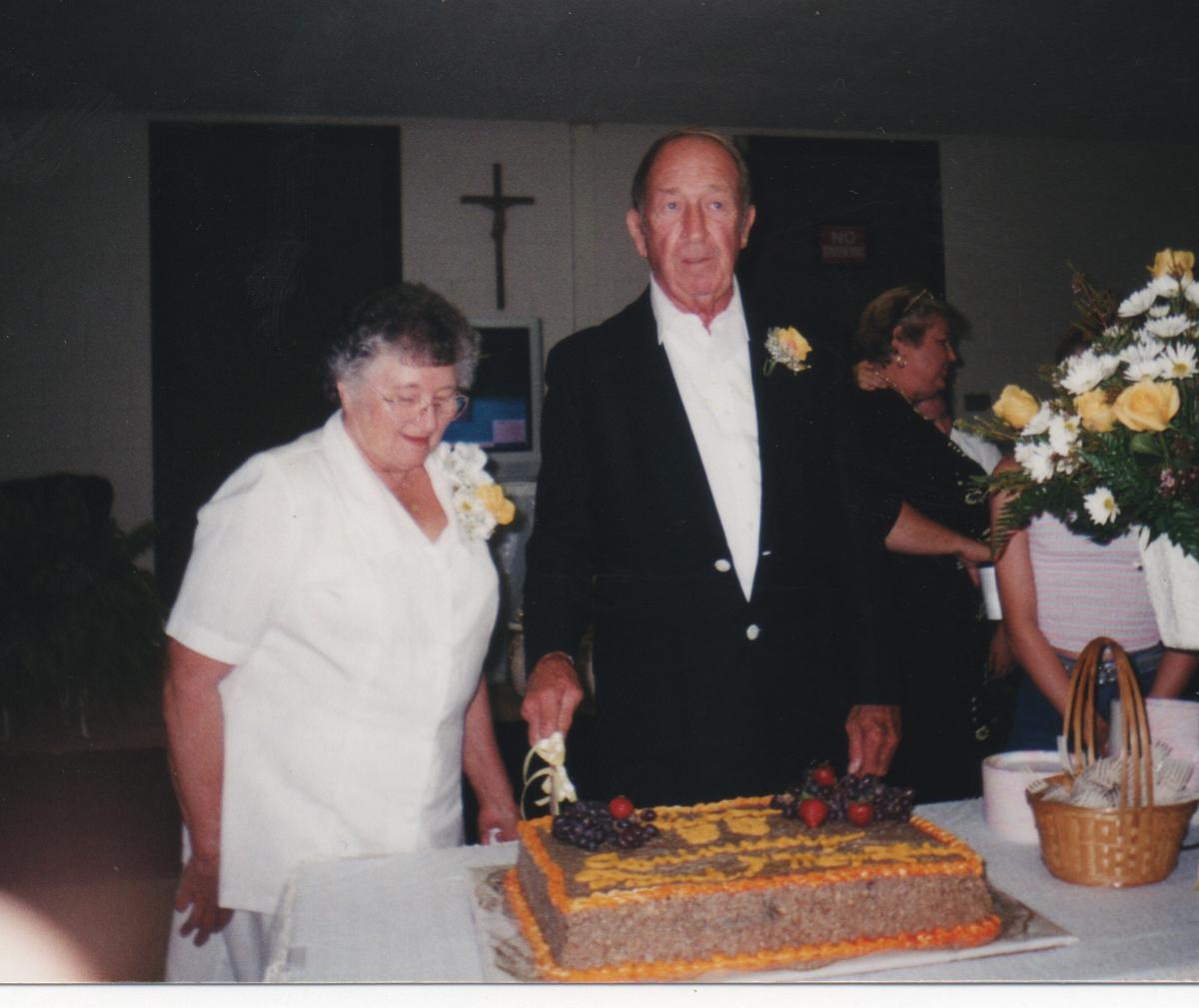TRANSCRIPTION
How did you like school
I went to Elementary school it was a small country school, St. Peters, I went there for eight years. Graduated from there with two boys, there were only three of us who ended up in the class but in the beginning there were like five or six of us and it ended up just the three of us. There were no school busses, so we had to walk to school and when my brothers went to school we rode a donkey. They uh quite school and didn't go to school anymore so I walked. It was about two and a half miles.
Was it up hill both ways?
(she laughs) No, it was a level gravel road.
Then my experience was that they (her parents) registered me because there was no transportation for me to go to Wilson County to Poth School and Karnes County busses came about a mile or two by road but if I walked across the field I could get on the bus. And I went to school in Jr. High in Falls City and High School in Karnes City. (She laughs) I experienced a lot. Good experience 'cuz I was introduced to um sun dance teaching in Falls City and teachers.
What kind of teachers? Where these schools chatholic schools?
Um no, they weren't catholic schools but most of my teachers were nuns. At St. Peters the collation sisters taught and the Order of Victoria, they wore white with maroon were at Falls City. But Mr. Mastrik was my math teacher he was science and math and the nuns taught everything else. Sister Amilda was very strict especially with the boys. (As she laughs she say's) But of course I never got in trouble. I only got slapped one time and that was during penmanship I don't know why, I guess I was holding the pen wrong or something. I enjoyed home making because I knew how to sew but over there I learned how to pick out a pattern and um cut the material right. We had half a year of sewing and the other half was baking. (giggles) I took it two years 'cuz I liked it so much. And that's how I learned to make the Mexican candy and fudge ohh and brownies also. I don't remember if we made yeast bread I just don't remember.
Were there any boys in that class?
No, it was just me and Rose. It was only girls that took that class its not like now were boys take it too. They don't even call it that anymore I think. But, I enjoyed my homemaking. Before that at St. Peters there was 4H club which would come every so often to talk to us. (Chuckles) I remember one year. And one summer it was during tomato grow'n time the school was closed but we were on the porch. We had to bring tomatoes, a jar, lids, and stuff and we canned tomatoes. We even had burners. Then we made aprons and let's see what else. It was for sewing experience. I liked to sew I started when I was nine years old. Did you sew all of your own clothes? Uh, no, grandma did most of that. After High School is when I started doing my own. Before that my mother would always choose the patterns. She would borrow patterns from our neighbors; they were made out of newspaper and stuff like that. Then with the patterns when you lay em' out and then I could go buy a pattern. They were cheap then like twenty-five cents.
My aunt Bina made me a bonnet once but the damn dogs took it. I walked all over the field but I never found it. The reason I blame the dogs is because is one time I was there late in the evening and I'd take my bonnet off cuz it was late already and there was a tomato cage and a stick next to it where I would hang my bonnet. And every time I would hang it up those dogs would watch me and that's why I figure the dogs took it.
When did you parents pass away? What was it like?
Ohh my mother let me think we were already living here. I think it was 89' but my father died young I think he was 62. But my mother lived to be uh well she didn't' live to her ninetieth birthday it was March and her birthday was in April. I didn't expect her to live that long because as long as I remember she had high blood pressure. I remember that she would was our clothes on the wash board and the dr. told her that she couldn't do it anymore. We had no electricity she we got her a speed queen washing machine with a motor. It was really wonderful because she would just start it she would just step on it and it would start. Before that Chester or one of the boys would help her with the big or heavy stuff. It was really hard to wash stuff. The pants, and my father would wear overalls. I can remember how heavy they would get when they were wet and then you put soap on them and it was hard. I was in charge of the little stuff though like the underwear or shirts but when it came to the pants and stuff I think my mother would let them soak. And then the ringers came out. That was something (laughs). Cuz the small things were easy it was the big things that were hard to ring out. We had like two tubs of rinse water. Put em' in one water then take em' out and put em' in the next water then turned them out and hung em'. We had two lines one in the sun for the whites I guess so that the sun would bleach them and the other one was in the shade for the colors.
My mother was a real good cook. I still say that she could make anything from flour, eggs, water, sugar, and milk. She would bake bread every day. Three loafs a day. Then when we ran out we would have bisckets or pancakes for breakfast.
She did go out into the fields with us during cotton pickin' time but, most of the time she just stayed home. She had enough to do with the three meals a day, and baking bread.

What did your dad do?
He worked the fields. We were farmers. The boyz growing up if there wasn't enough work they would go around to work for other people. Mostly ken folk first. You know cuz some families didn't have sons to do the work or they didn't have a lot of kids. They did this mostly duringcotton pickin time or hay making time. And some relatives that lived on sandy soil they grew peanuts and they would go help. I guess they would plow'em out cuz I went to Aunt Helen's once and after they plowed em' out we would take em' and knock off all the dirt and stand them up where thepeanuts were up and the leaves were down to kinda stand them up. That was my first experience with bo-nettle cuz we didn't have any where we lived. I had touched it with my ankles and oh my gosh it burned like hell (laughs) I never knew what it was.
When did you start working out on the farm?
Lets see, I don't even know my age but, about five. First thing is learning how to do the chopping. My daddy would plant a little of everything. Daddy planted onions we even had a few rows of garlic and um you had to be very delicate because they were very important. We picked cotton when it was time and hay as well. Hegira but that was mostly for the cows and chickens. Daddy raised hogs and cattle but not too many just a few milking cows. Momma always had chickens so we never had to buy eggs. We would go to town to sell them. Then go to the grocery store to buy whatever else we needed.
How often did ya'll go to town?
Ohh, I think they would go maybe once a week, yah. I didn't get to go a lot but I loved it when I could and I only could only go if it was a Saturday. There was a lot to do at home. We always had something to do. And seeing as how I was the last one there I think I got to go more than everyone else. I think they felt like they had to take me (laughs for a while and then continues). Not to often a got ice cream it was twenty cents a cone (smiles). Whatever we grew in the garden we canned for later. Like the pickles, especially the dilled pickles would come in handy during the winter months when we butchered a pig. They were so good with pork, we would make chow-chow and we made our own ketchup. I'll never forget my sister (laughs) and my momma had a whole bunch of onions and she put her outside to peel em'. There were tears just a rollin down her face, even though she was outside. I loved it (laughs) cuz she had a whole basket of onions. The chow-chow was made from cucumbers onions and cabbage. And I don't remember us raising cabbage but I think we would get it from our grandparents they had a sandy soil or maybe we would go to our neighbors. I don't know. The Kuology were our neighbors and like if they butchered a pig and we butchered a pig then we would trade you know.
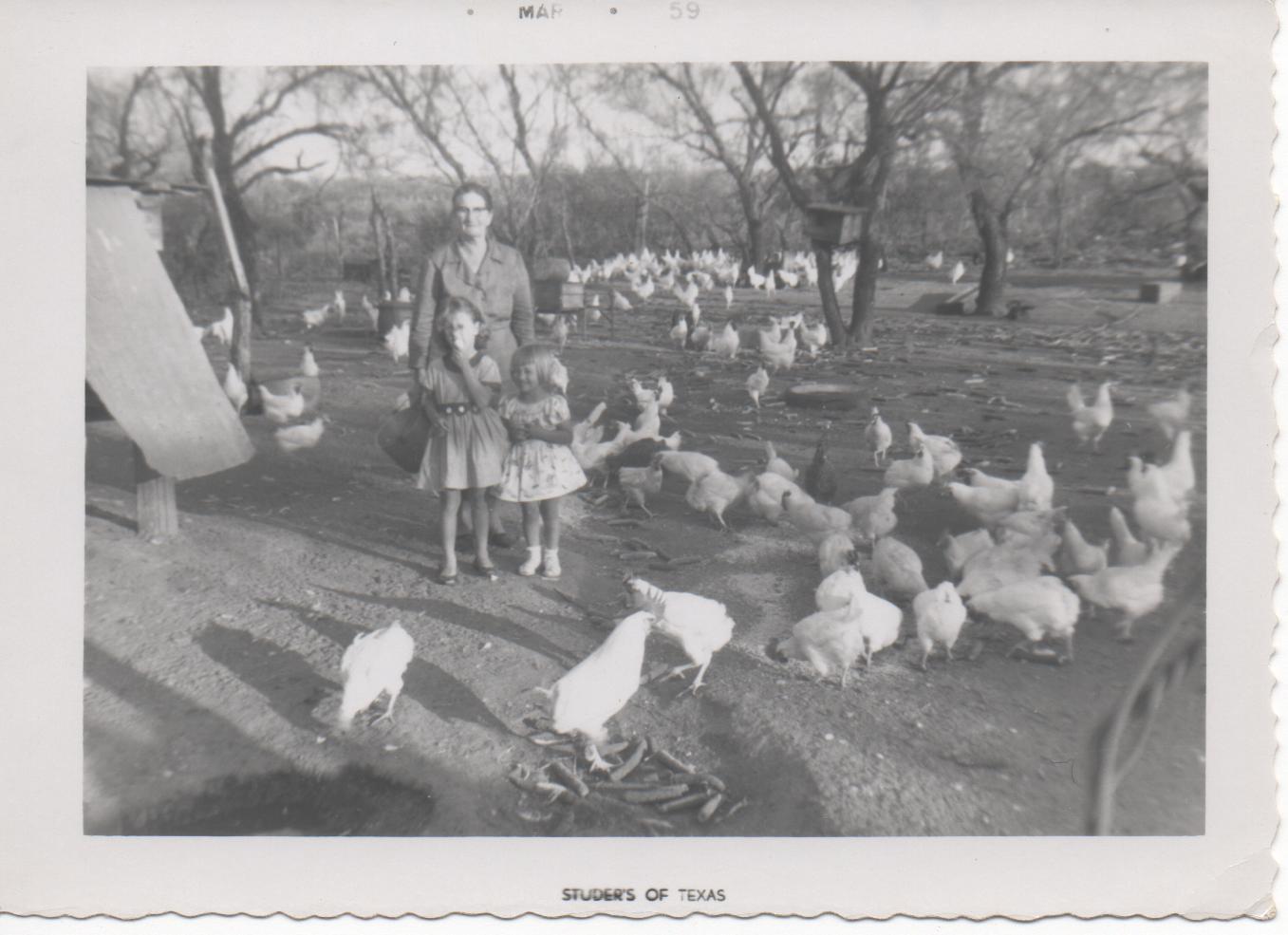

Did ya'll do that a lot? Trade I mean.
Ya, as often as we could. We traded because of a, we didn't have a refrigerators we had no electricity. I don't even know. The neighbors I think had an icebox on their back porch. But we didn't have one until my Aunt Helen got electricity and she got a refrigerator. Then we got hers. It was neat, and it was, it had a, it was about so tall and then the top part is where we put the ice, and then it had two doors on the bottom you know with shelves where we put the stuff. It was neat. Then you had to put a pan under to catch the water when it melted. Water in my area was very scarce especially during the summer months. And uh, I guess everywhere and our well wasn't very good cuz it had a lot of minerals in it. I don't know what kind… I don't think it was sulfur but something like that. We drank the water but it was real hard. We had to save rain water to wash our cloths in and it didn't rain a lot but we had a cistern with a barrel next to it and the water went there. There were times when we had no water and we would load up the truck and go to Cibolo Creek. We would make a day of it, the boys would go fishin and momma would take the cloths and wash, then she would come home and hang em' on the line. You know we did what we had to do.
When did you get electricity?
When we got electricity, I guess I was in Falls City School. I think I was a sophomore and the first thing we got was a refrigerator and an iron (she giggles) momma liked that (laughs). The main ones. Before that we had a radio and we got that from our uncle cuz he got an electric one. People recycled everything back in those days (laughs). There was always someone that needed it. Even cloths we didn't have enough.
What was your work experience like?
I just worked at home and when I graduated from high school I came to San Antonio and I got a job at Joski's of Texas. It was a big department store on the corner of Commerce and Alamo. And um, I started working, let's see, I came in the fall because I guess I stayed home to help with the crops and all. They started me off in millenary and then in gift wrapping. Simple gift wrapping. And then after that I went back to millenary. That's where they sold hats. Lady's would come and buy big fancy hats. I never experienced that before. Women would come and put things on their hats or come to take something off and add something else. But all women had to wear hats in those days. It wasn't like in the country where we wore kepcas in order to protect us from the sun. My mother was very protective of that. We always wore long sleeve dresses and during the summer three-quarter length or whatever you know. But she always believed in protecting us from the sun.
So what did you do with the hats?
I mostly put them in boxes. Put tissue paper so the hats don't get messed up. We didn't put'em in bags like they do, we put'em in boxes, hat boxes. I was in a little office. In those days they had little shoots where you put the money or credit card and it would shoot it to another place. You know like at the bank it worked the same way. I'll never forget the time I sent one wrong cuz there were like one, two, three tubes. One for cash, one for credit, and the other one was for when they came back (laughs and continues). And I sent one the wrong shoot but, I figured opps, they'll figure It out (laughs).
What did you do after that job?
Then my aunt suggested that I work at the Frost Bank, so I worked there. I started off at the statement department. Where I would mark off the (pauses to think and then continues) people would come during the week because the wanted their statement or they didn't get them comin to them. So I would go to the book keeper and take out the statement they had in there and mark off the certain date and type up a sheet and put new sheet in there and put the balance on there. That was my real first job. And then, after that I started posting on the books and they give you a statement book first to get familiar with the names and signatures. And then the book keeper had bigger sheet, yellow sheets, we had green sheets so all of them could fit the envelopes to be mailed out but the book keeper had bigger sheets they were wide like this (makes gesture with hands). We had these big machines with all these keys and we had to punch'em. Like um, first of all when we got our checks we got these um (thinks) I don't know what you'd call them, sorters I guess they were about so long (makes 2' long gustier with her hands) and it would divide alphabetical. We had a head book keeper where the the girls from upstairs would bring them to her and she would take the totals and then the book keeper had to post and go give the numbers she posted to the head book keeper, and any checks that didn't belong in your books she had to return to her because sometimes the sorters in the mesonie would make mistakes or we would get the wrong stuff. I worked there,(thinks) I was done in forty-nine. I started in fifty got married in fifty-two worked before up until let see Rachel was born in August I guess I worked until about June and then just stayed home with her. (Laughs) and then it was just one right after the other. They called back, they wanted me to come back the next summer but I thought where am I gonna leave her. At that time there was no nursery's like there are now, you had to leave them with somebody and I saw my neighbor taken care of some kids and I watched when the children would play in the yard you know and how they would be bigger and they would ignore or gang up on the smaller ones and I thought to myself no, I not gonna trust someone else with my child (laughs). And then I got pregnant with Russell and so it went on (smiles and giggles). Stair-steppers you know.
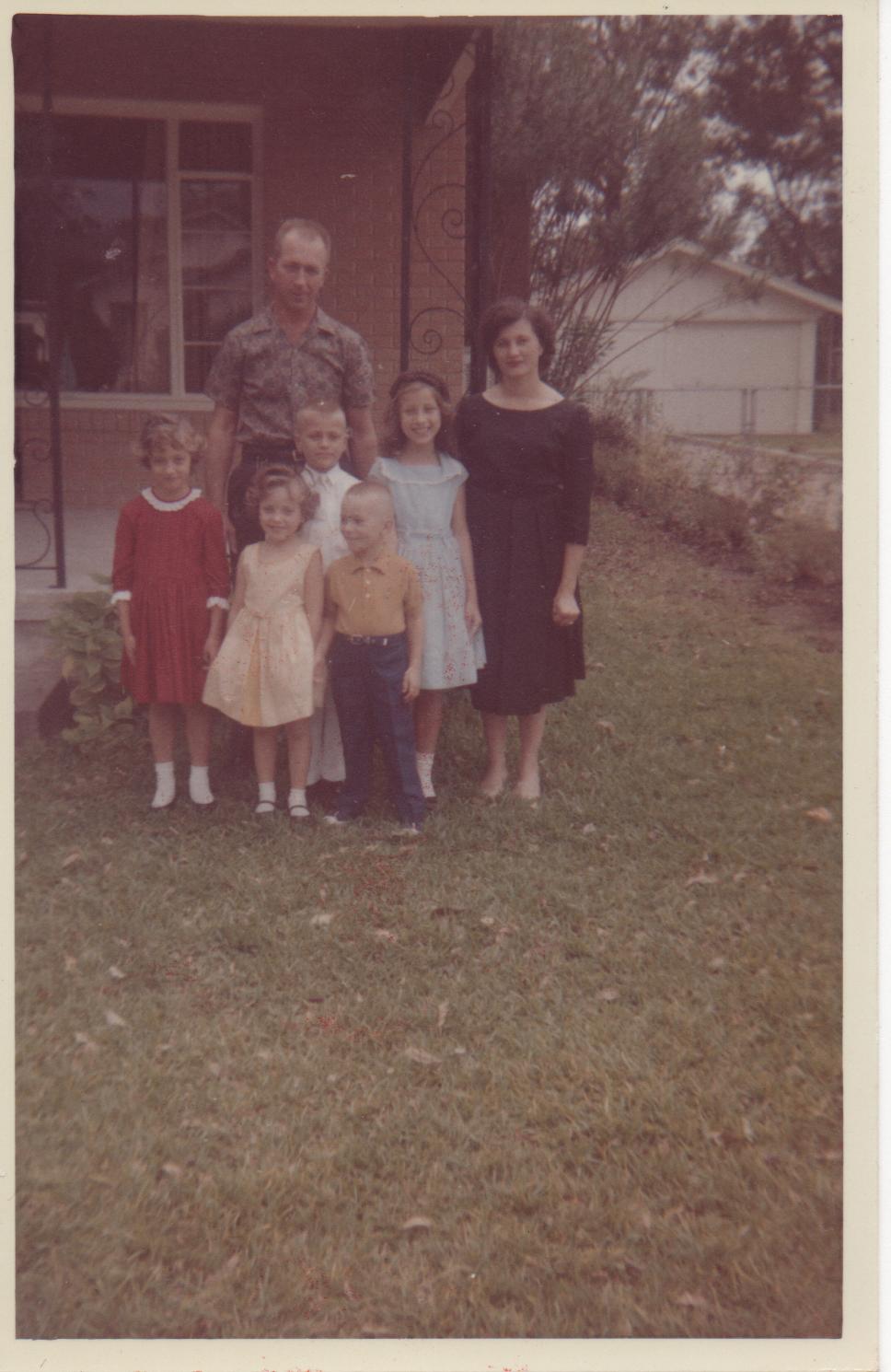


We lived in our first house; we had all seven kids there. On Bran Haven, well its Pecan Valley now but it was Artesia wells. And our kids went to, Rachel started at St. Gerald's even though we were in walking distance to PF Stuarts School. We sent her to porocual school and then Russell started. Then we moved to closer to St. Geralds on Dillworth you know. They walked to school and came home for lunch (laughs) it was an experience for them too cuz it was mixed you know however, most of the black kids went to Holy Redeemer, that was the other school. We walked to church from there about a block and a half. I think there was only one black family on our block and I don't know if there were any across the street or not I don't think so. Just the one family. Even in our first house I went there cuz we rented it out and I had to go fix a window and the kids were comin out of school and it was like a black cloud coming down Pecan Valley. When we lived there it was Mexicans and then us whites. But it changed fast. After the kids were out of school Frank and I started Syma Painting.

During the war what was it like here?
Ohh, it was very sad because, who went first, I don't remember who went first (laughs) I wanna say the older one went first. Stanly and Isador got drafted and chester was drafted or joined cuz he was in the Air Force and Stanly and Isador were in the Army. They went overseas in no time and Isador we very seldom heard from him. We would get what we called V-mail, little letters like a letter that was folded into three and they were censored. It would be copies of them, sometimes we got the real letter but that was rare. My mother would make me go to the mailbox everyday to see if we got a letter. It was so exciting to get a letter. We did a lot of praying, a lot of praying. We would say the rosary as we knelt by our beds. Then Chester was goin but somehow he injured his knee. He was goen to gunners school. And Guss was in the Army also, and Frank was Navy. Stanley was sent to Alaska and from there to the Elusion Islands, the Jap people must have been involved there or something. Where Isador was in the Pacific Ocean, he got malaria over there. I remember how excited we were when we heard that he was back here at Brook Army Medical Center. My dad woke up to chuck corn at four in the morning so he could feed the hogs so that we could come over here to San Antonio before day break. Theresa took of work to come with us (Laughs) to see him. But he was real dark complected and very skinny. He was always skinny the smallest in the family always and after that it was different. His eyes, his eye balls were yellow looking and he would get the shakes and chills. He couldn't come home for weeks. I remember his cloths were dark, his uniform I guess and he changed. When he got home the neighbors wanted to talk to him he told me everything was to strange. It took him awhile to get used to everything again. I don't know when he was discharged it seems like someone was always in so its hard to remember you know. I mean it was different, hard but it was worse when the boys were overseas cuz so many, so many boys were killed. Like in Hopson had four or five which was a lot, Falls City had two, Sesta Hova, Pana Maria had one I think he was on a cruise ship. I wasn't a lot but for Hopson community it was huge.
My mother really believed in prayer. My mother raised turkeys as well and during the war the price of turkeys went up and the price of eggs went up and she was mak'in good money. We would let the turkeys loose and close 'em up at night and then let'em out bout mid-day and she would always take rosary with her she had a handkerchief with her she tied the corner to the rosary so if she dropped it she could find it. A lot of times she would say I could relive her. One time I was watch'in them and they found a snake, it scared me to death (laughs). Turkeys will put their heads up and they start this chirping. I thought to myself what do I do, my mother would kill the snake but I panicked. You live longer and you learn that if you hit them behind the head you break their neck and you kill them, but I didn't know that (laughs). It's funny because our gunnies would chirps to and one time daddy's straw hat flew off and all of a sudden they all started goen crazy. It was like danger, danger! (Laughs) Them and peacocks are all good watch dogs. Once when we moved to San Antonio I had stayed home, I had a cold or something so I was laying down (laughs while saying) I thought I was hav'in hallucinations. I saw a head bob past my windows and I got out of bed and it was a damn peacock. He had gone to my garden and I thought ohh no, so I chased him out and he flew over the fence and straight towards the cows. He got the cows all excited, (laughs) I got in trouble for that (laughs).

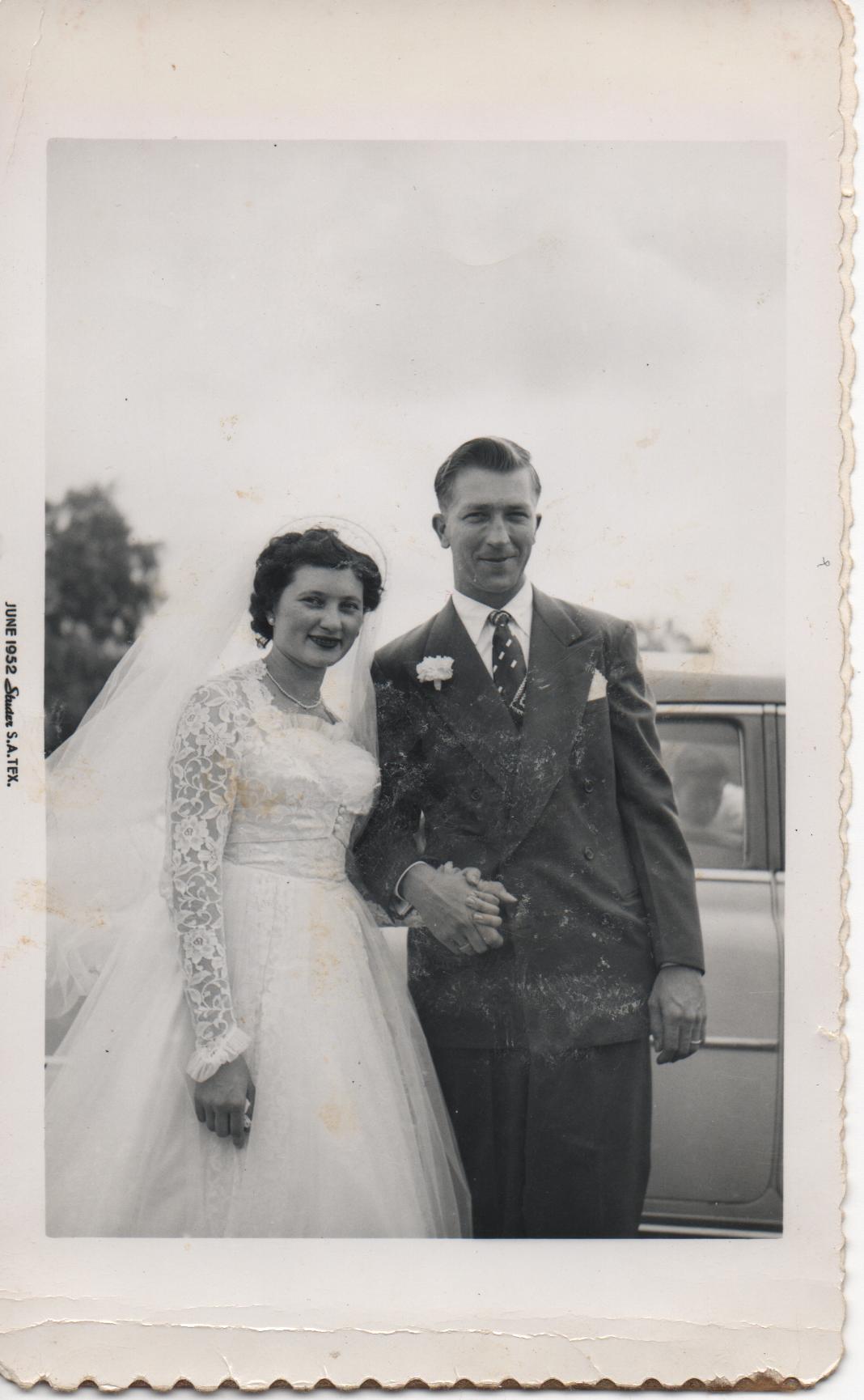
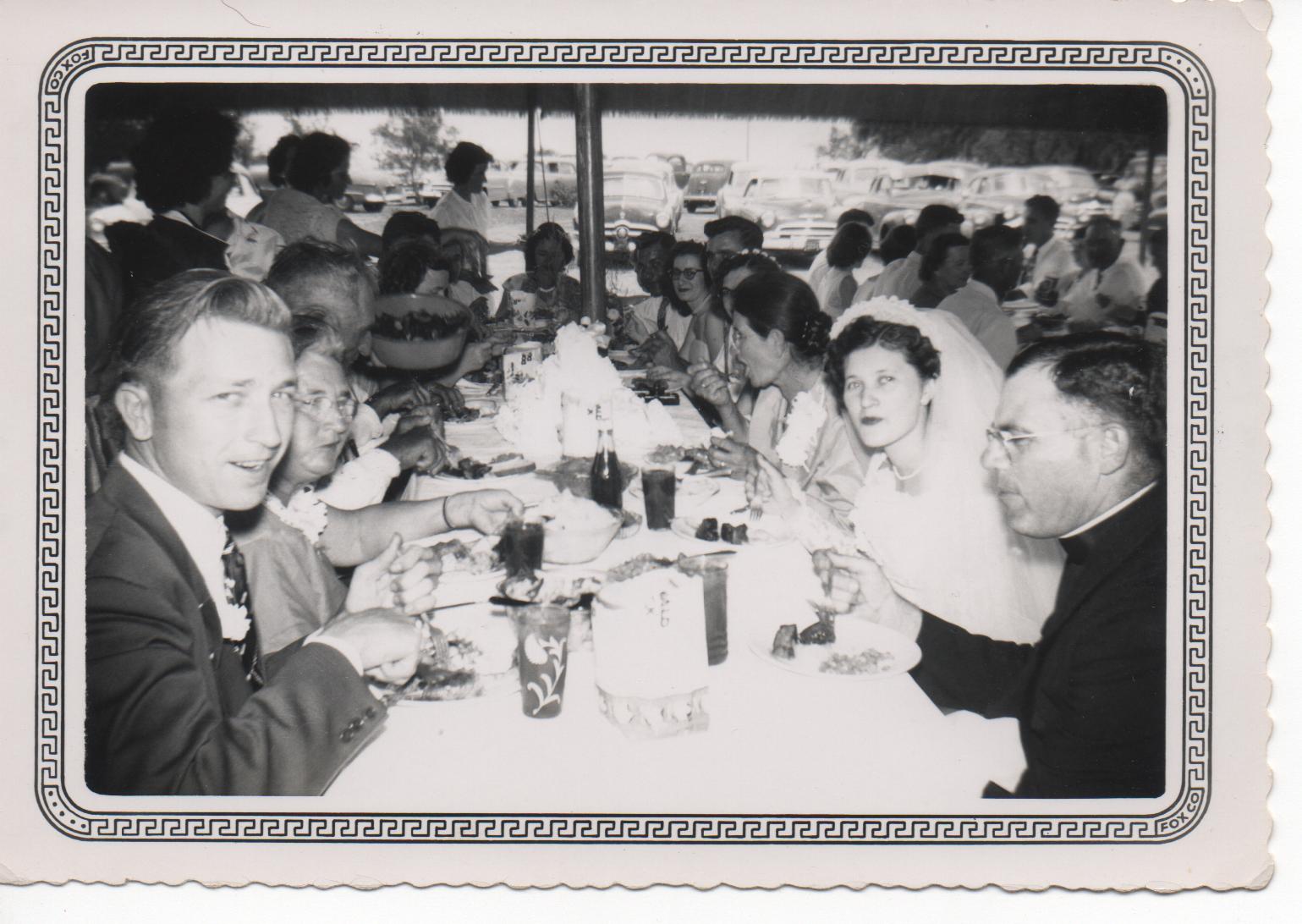
How did you and frank (grandpa) meet?
We met after I moved to San Antonio. He had been back from the war and was working here. He was friends with my brother somehow I don't know. I was over at Chester's house helping with the kids and he came by there one time and I was sittin on the porch. He had come to see Guss to see what they were gonna do that night and um, I was just visiting cuz I was living in San Antonio at the time. Anyway he asked Guss how old I was (laughs) and everything. Well he wrote me a letter tellin me that he was gonna come pick me up Saturday evening but, the letter didn't come till Monday (smiles, looks down and chuckles). He came Saturday night and my hair was in rollers and I was in my night gown. We ended up double dating with my brother and his wife at some kinda club near Hopson. Then I was so excited cuz I had a boyfriend (blushes). And then it just unfolded and well you know the rest (giggles). There were times that I wondered if it was right but I said what the hell why not. Now he's just a pain in my ass (laughs out), I've been married almost my whole life (laughs) sense 52'.

What Did Frank do for a living?
When we lived in Dillworth he was a carpenter then he did remodeling with his brother, then became a paint contractor and his boss was always leaving to go fishing and hunting and would leave him in charge. He said if that's all it takes then I could do that to. He came home one time I guess things didn't go very well on the job anyway he came home around three o'clock and informed me that he was gonna go into business by himself. I said ya' and he says ya, and your gonna help me (laughs). Just like that. I says what am I gonna do and he says you'll learn. That was that. We started with small residential jobs, but we needed money so for payroll we went across the street the Federal Credit Union and borrowed like $500 to start us off. We always tried to pay our bills and keep ahead you know, but I had no type writer, no adding machine, nothing. So one time he comes home with an old adding machine one of pulls it wasn't electric but he put it on the table and said here you go so stop bitching (smiles). After a while business picked up and I remember we did a government job and I had to do payroll by hand. I had to put the guys name, his salary, wages, and how much he got paid on the job. Then on the back you had to sign, when his payroll began and ended and all that stuff. Then he picked up a type writer from a job site they were remodeling. And I took typing in school so that helped, after all toughs years.
When and where did you learn how to drive? What was it like?
Ohh, I learned how to drive (pauses and giggles) goin to the mailbox when I was fifteen. Sometimes it was so hot during the summer. My father had this34' ford it was a one seater, and ill never forget this time that the peddle stuck on me while I was goen over a bridge and I couldn't adjust it cuz on those you had to reach down to adjust it and I couldn't do it with my shoes so zoomed through that bridge with my eyes closed (giggles). But you know accidents happen (smiles). You have to know what to do because you never know when something is gonna happen. Can you imagine me running into a fence or hitting another car?
What is your fondest memory growing up?
Learning how to shoot a gun, no. I was always scared of guns, you know. Long time ago girls didn't do that kind of thing it wasn't proper. Fishing, no I didn't really do that either. I don't know, I guess goin to school. I always liked goin to school, it was my get away. I loved learning new things. I was the only one who finished high school. My brothers didn't even finish elementary school and Christine only made it to middle school.

Is there anything else you would like to add to this interview?
Ya, I am so proud to have been able to live my life this way I wouldn't change a thing.
